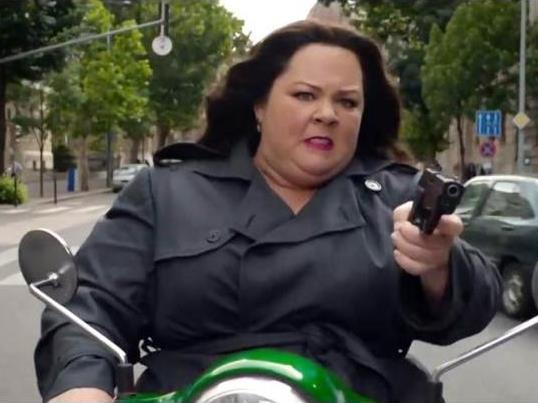For as long as spies have been sneaking through the shadows and slinking across cinema screens, films have tried to mine the amusing side of espionage. For every suave, shaken-not-stirred operative, there’s a bumbling joker threatening to give the game away, and for every Bond, Bourne and Mission: Impossible series, there’s an Austin Powers, Johnny English and OSS 117. Spy joins the latter’s satirical ranks with its own spin on globetrotting hijinks, as a desk-bound CIA analyst becomes a gun-toting field agent. Parodying the secret sleuthing genre isn’t the film’s only aim, as it calls attention to clichés of gender representation prevalent in spy efforts and movies in general.
Of course, writer/director Paul Feig isn’t breaking the mould by focusing on standards surrounding most depictions of international men of mystery, or by highlighting the film industry’s preference for conventional notions of beauty and value. Instead, as he did in box office hits Bridesmaids and The Heat before it, he’s adding a female-oriented perspective to the kind of content typically associated with males – first raucous pre-wedding antics, then buddy cop shenanigans, and now crime fighting via global intelligence.
Indeed, in Spy, the story doesn’t just follow an office worker given a taste of active duty, but an overlooked 40-year-old woman getting her big break. Susan Cooper (Melissa McCarthy, St. Vincent) is a behind-the-scenes handler applauded for her partnership with one of the agency’s best operatives, Bradley Fine (Jude Law, Black Sea), yet openly laughed at when she suggests she spend time on the front lines. Her proposal is one of necessity, after arms dealer Raina Boyanov (Rose Byrne, Annie) learns the identities of the CIA’s figures in the field. Stopping the sale of a suitcase-sized nuclear bomb becomes a job for someone untried and unrecognisable, and Susan fits the bill.
Cue a raft of routine scenarios that highlight her vast difference to the bulk of agents, which is as much an acknowledgement of the spy status quo as it is the basis for easy sight gags. There’s never a shortage of action-packed knife fights, scooter rides and helicopter trips that test Susan’s mettle in her hopping from Paris to Rome to Budapest, or of people declaring she isn’t up to the task – ultra-macho rogue operative Rick Ford (Jason Statham, Fast & Furious 7) the loudest among them. Thankfully, even though Feig might labour his point too much, and sometimes buries it in too many obvious jokes based on reactions to McCarthy’s appearance, the film never loses sight of its main message. The feature’s protagonist is a capable spy finding her confidence in outlandish circumstances despite expectations to the contrary, and those who doubt her frequently get their comeuppance.
In lesser hands, the fine balance between subverting and emphasising stereotypes might not have been found, particularly given the movie’s fast-paced, sleekly-shot aesthetic adherence to the customary genre look; however it is McCarthy who makes the material work. The actress is gifted her best showcase role to date, one that allows her to demonstrate her mastery of multiple moods, affords an opportunity to further display her physical and verbal comedy skills, and grounds her character in competence rather than obnoxiousness. Susan might continually have to prove her worth to everyone within the film – other than her sister-in-sidelined-arms, Nancy (Miranda Hart, TV’s Call the Midwife) – but thanks to McCarthy’s multifaceted performance, she never needs do so to the audience. Spy revels in seeing its lead hit her stride, sharing in her joy rather than asking viewers to be surprised by it.
Though the feature clearly relishes her versatility, McCarthy isn’t the only one finding her niche here. Indeed, perhaps Spy‘s true strength is bursting the boundaries of all its performers, with Law and Statham each skewering their usual on-screen presence, and Byrne continuing to flex her comic muscles as the prim and prickly – but never one-note – villain. A movie that starts by spoofing its titular genre and shining the spotlight on gender typecasting becomes one that has fun with testing the limits of all film industry banalities. Even when its zingers don’t always land and when its plot is stretched beyond normal espionage standards, that’s what hits the mark.
Rating: 3 stars out of 5
Spy
Director: Paul Feig
USA, 2015, 120 mins
Release date: 21 May
Distributor: Fox
Rated: MA
Actors:
Director:
Format:
Country:
Release:





